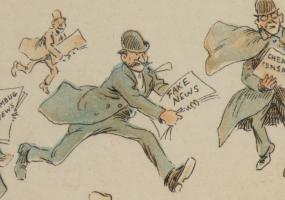Berlusconismo and Murdochismo
22 Jun 2012
Damien Carrick writes: In 2001, Bill Emmott famously wrote the headline "This man is not fit to be Prime Minister of Italy" above a photo of Silvio Berlusconi on the front page of the Economist. In the seminar Emmott outlined how Berlusconi came to effectively control the Italian media and how this in turn enabled him to gain and maintain political power. Emmott compared and contrasted Berlusconi's trajectory with that of Rupert Murdoch in the UK. Emmott maintains that Silvio Berlusconi's transition from media mogul to PM should not be simply dismissed as “an Italian exception”. Rather it should be considered as part of a wider phenomenon of corporate power wielding political power. In many ways Berlusconi and Italy are unique. A flamboyant personality, Berlusconi is happy for the world to know about his "bunga bunga" lifestyle. It can also be argued that Italy is somewhat exceptional among western democracies because of its "machismo" culture and the on-going challenge of dealing with the mafia. Ultimately however, Emmott argued that Italy should not be dismissed as an aberration. He points to interesting parallels between Berlusconi and Murdoch. Both were "destructive innovators" in the 1980s. Although today "sworn enemies", at one point they were friends. Murdoch tried to persuade Berlusconi to stay out of politics. Berlusconi ignored this advice. The property developer turned commercial TV baron used his media and financial power to create a political party. Unlike the BBC, the Italian national public broadcaster RAI has no tradition of independence from government. Upon assuming political power Berlusconi (like previous administrations) turned RAI into a political mouthpiece. In Italy, newspapers receive state subsidies if they can establish a connection to a political party. However Emmott argues this system does not create meaningful media plurality. Italian newspapers have low circulations. TV is much more influential that print media. Berlusconi used his domination of private TV and influence over RAI to freeze out coverage of the opposition and to conduct smear campaigns against his political enemies. Emmott points out that Rupert Murdoch wields his considerable UK media power in a very different way. Unlike Berlusconi, Murdoch has not sought political office. Rather, he offers political support to whoever he thinks is likely to win and will serve his commercial interests. Another important difference between the UK and Italy is the existence of the BBC, a strong independent public broadcaster. For Emmott, three regulatory reforms should be considered: First, in Italy there is a pressing need to prevent politicians from controlling RAI. Second, in Italy, the UK and elsewhere, there has been a failure to adequately understand the consequences of the concentration of media power. The issue is not necessarily around concentration per se. It is about the strength of the voice rather than the size of the voice. Emmott argues that a media market is not like beer or chocolate, and there is a case for a separate, specific anti-trust law for the media. Third, given "the mud machine" we should consider forms of media regulation that go beyond libel and privacy laws. Given the difficulty of defining "unacceptable behaviour", Emmott is sceptical about how this could be done but does think it important to consider. Looking to the future, Emmott counsels against consigning Berlusconi to the political scrap heap. Berlusconi still presides over the strongest single political party and remains an enormously powerful media baron. As for Murdoch, while the Leveson Inquiry may jeopardise his UK interests, his commercial future in other countries (including Italy) is looking bright.





